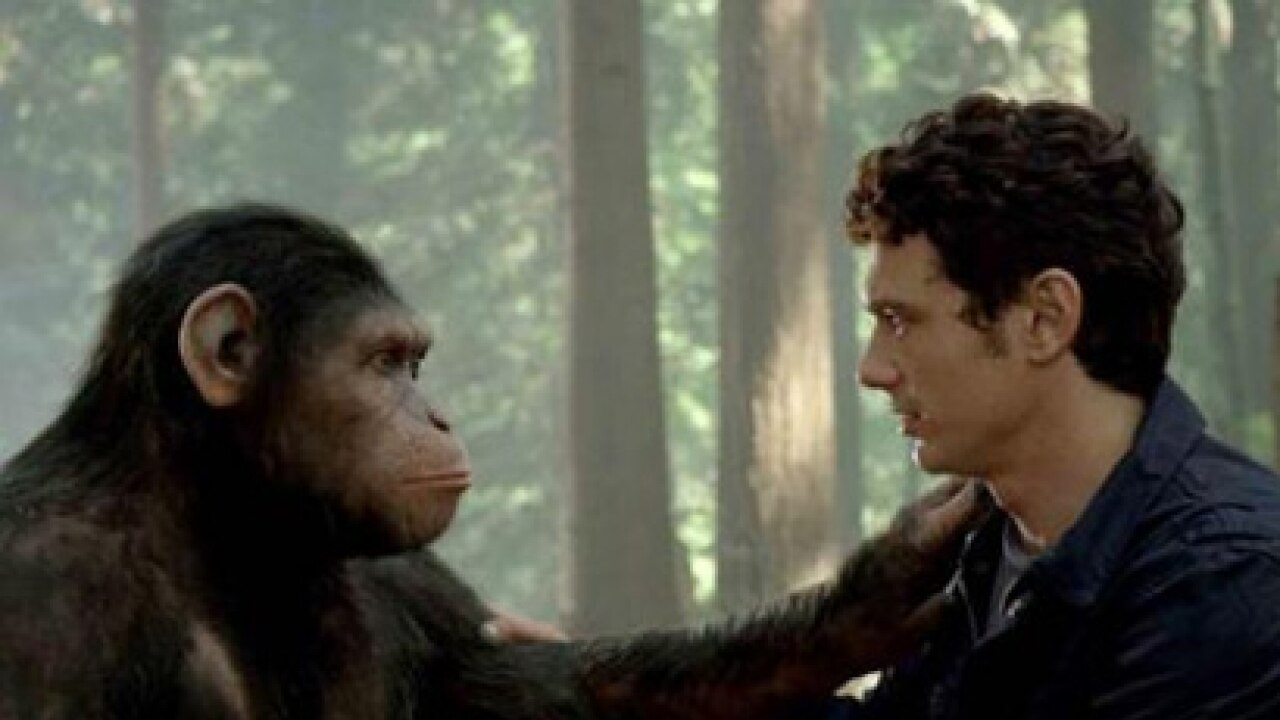
Film: Rise of the Planet of the Apes
Director: Rupert Wyatt
Cast: James Franco, Freida Pinto, Andy Serkis, John Lithgow, Brian Cox, Tom Felton
Rating: ***1/2
Dr Will Rodman’s (Franco) desperate attempts to rid humanity of the menace of Alzheimer’s (his father Charles, Lithgow, suffers from a crippling form of the disease) results in him genetically modifying a chimpanzee named Caesar (Serkis using motion capture technology) in an experiment. Rodman, secretly whisking away Caesar away from his research centre, domesticates him to the delight of Charles.
As the months roll by, Rodman’s dream come closer to reality with his cure temporary reinvigorating Charles’s brain cells.
Though Caesar displays intelligence nearing that of a young child, his animal instincts get the better of him and Rodman is forced to deposit him in an institution run by John Landon (Cox) his son Dodge (sadistically played by Felton). Initially out of touch with his own, a widening gulf is formed between Caesar and Rodman with the former plotting his race’s liberation from the tyranny of Homo Sapiens.
Rise of the Planet of the Apes, a reboot of the Planet of the Apes franchise, narrates the events that led to apekind eventually making a monkey out of humanity.
Though there are a bunch of references to the early film (Bright eyes, It’s a madhouse! You damn, dirty ape etc), Rise starts out on a clean slate.
Bearing closer resemblance to 1972’s Conquest of the Planet of the Apes than the 1968 Sci-Fi masterpiece, we now know from the onset that it is Earth that is the theatre of the simian-induced apocalypse.
Thematically, the film isn’t as rich in irony as the Planet of the Apes which was about: a) The nightmarish journey of a misanthrope (Charlton Heston in his teeth-grinding glory) who is thrown into an alien civilization with even lesser regard for his species, and b) the dogmatic nature of a social order bent on preserving itself even if that means lying about its origin.
And since there is a hint of the disaster genre here you can well be sure that the kind of message is a cautionary one. Rodman’s Frankensteinian obsession (no matter how well-meaning his intention) to control the natural order of things results in the very future of humanity having to pay the price.
But this isn’t all there is to Rise….
Even though you may go in with an idea about how things might play out, the film always manages to keep you on the edge of your seat.
The story of Caesar, portrayed by Serkis, the Marlon Brando of motion capture, is quite captivating and not quite as predictable as one would think.
As he goes through circumstances that could make or break any sentient primate with above average intelligence, Caesar, while sometimes being endearing, has you more than once reaching out for a non-existent box of tissues.
With his expressions and mimicry, Serkis has more talent in one flea on the back of his digital self than Pinto (playing Rodman’s vet love interest; she isn’t important) has in her entire body.
Technologically, the film with its ubiquitous use of CGI (no animals were filmed) is a marvel, especially in the scenes where the simians go apesh*t on San Francisco’s Golden Gate Bridge.
Though, the apes are significantly less anthropomorphic than the way they are when Taylor sees them in the future (We'll give them a couple of millenia to evolve) and, in all likelihood, we may not be seeing the Statue of Liberty halfway submerged on the dreadful Planet of the Apes in any future sequel, with Rise, the series starts off on the right paw.